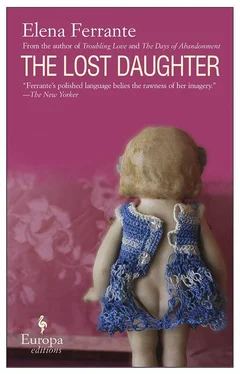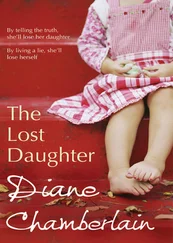“What will you do,” I said ironically.
“I know what I’ll do.”
I caressed one arm lightly as if to tame her. It seemed to me that she was dutifully mimicking the tone and the formulations of her family, she had even accentuated the Neapolitan cadence to be more convincing, and I felt something like tenderness.
“I’m fine,” she repeated several times, and told me how she had fallen in love with her husband, she had met him in a discotheque, at sixteen. He loved her, adored her and the daughter. She laughed again, nervously.
“He says my breasts are exactly the size of his hand.”
The phrase seemed to me vulgar and I said: “And if he should see you the way I saw you?”
Nina became serious. “He would cut my throat.”
I looked at her, at the child. “What do you expect from me?”
She shook her head and murmured: “I don’t know. To talk a little. When I see you on the beach I think I would like to sit the whole time under your umbrella and talk. But then you’d be bored, I’m stupid. Gino told me that you’re a professor at the university. I was enrolled in literature after high school, but I only took two courses.”
“You don’t work?”
She laughed again.
“My husband works.”
“What does he do?”
She avoided the question with a peevish gesture, and a flash of hostility lighted her eyes. She said: “I don’t want to talk about him. Rosaria is doing the shopping, at any moment she might call me and then my time is up.”
“She doesn’t want you to talk to me?”
She frowned angrily.
“According to her I mustn’t do anything.”
She was silent for a moment, then she said hesitantly:
“May I ask you a personal question?”
“Let’s hear it.”
“Why did you leave your daughters?”
I thought, searching for an answer that might help her.
“I loved them too much and it seemed to me that love for them would keep me from becoming myself.”
I realized that she was no longer laughing continuously, now she was paying attention to my every word.
“You didn’t see them for three years.”
I nodded yes.
“And how did you feel without them?”
“Good. It was as if my whole self had crumbled, and the pieces were falling freely in all directions with a sense of contentment.”
“You didn’t feel sad?”
“No, I was too taken up by my own life. But I had a weight right here, as if I had a stomachache. And my heart skipped a beat whenever I heard a child call Mama.”
“You felt bad, then, not good.”
“I was like someone who is taking possession of her own life, and feels a host of things at the same time, among them an unbearable absence.”
She looked at me with hostility.
“If you felt good why did you go back?”
I chose my words carefully.
“Because I realized that I wasn’t capable of creating anything of my own that could truly equal them.”
She had a sudden contented smile.
“So you returned for love of your daughters.”
“No, I returned for the same reason I left: for love of myself.”
She again took offense.
“What do you mean?”
“That I felt more useless and desperate without them than with them.”
She tried to dig inside me with her eyes: into my chest, behind my forehead.
“You found what you were looking for and you didn’t like it?”
I smiled at her.
“Nina, what I was looking for was a confused tangle of desires and great arrogance. If I had been unlucky it would have taken me my whole life to realize it. But I was lucky and it took only three years. Three years and thirty-six days.”
She seemed unsatisfied.
“How did it happen that you decided to go back?”
“One morning I discovered that the only thing I really wanted to do was peel fruit, making a snake, in front of my daughters, and then I began to cry.”
“I don’t understand.”
“If we have time I’ll tell you.”
She nodded, in an ostentatious way, to let me understand that she would like nothing more than to stay and listen, and meanwhile she realized that Elena had fallen asleep and she gently removed the pacifier, wrapped it in a kleenex, put it in her purse. With a pretty frown she conveyed the tenderness her daughter inspired, and began again:
“And after your return?”
“I was resigned to living very little for myself and a great deal for the two children: gradually I succeeded.”
“So it passes,” she said.
“What.”
She made a gesture to indicate a vertigo but also a feeling of nausea.
“The turmoil.”
I remembered my mother and said:
“My mother used another word, she called it a shattering.”
She recognized the feeling in the word, and her expression was that of a frightened girl.
“It’s true, your heart shatters: you can’t bear staying together with yourself and you have certain thoughts you can’t say.”
Then she asked me again, this time with the mild expression of someone seeking a caress: “Anyway, it passes.”
I thought that neither Bianca nor Marta had ever tried to ask me questions like Nina’s, and in this insistent tone. I looked for words, in order to lie to her by telling the truth.
“With my mother it became a sort of sickness. But that was another time. Today you can live perfectly well even if it doesn’t pass.”
I saw her hesitate, she was about to say something else, she stopped. I felt in her a need to hug me, the same need I, too, was feeling. It was an emotion of gratitude that manifested itself as an urgent need for contact.
“I have to go,” she said and instinctively kissed me on the lips with a light embarrassed kiss.
When she drew back I saw behind her, at the end of the garden, against the stalls and the crowd, Rosaria and her brother, Nina’s husband.
I said softly: “Your sister-in-law and your husband are here.”
There was a spark of irritated surprise in her eyes but she remained calm, she didn’t even turn around.
“My husband?”
“Yes.”
Dialect got the upper hand, and she murmured: what the fuck is he doing here, that shit, he was supposed to come tomorrow night, and she pushed the stroller carefully in order not to wake the child.
“May I telephone you?” she asked.
“When you like.”
She waved a hand cheerfully in a sign of greeting, her husband waved back.
“Come with me,” she said.
I went with her. The two siblings, standing at the entrance to the garden, for the first time struck me with their resemblance. The same height, the same broad face, the same strong neck, the same prominent, fat lower lip. I thought, marveling, that they were handsome: solid bodies firmly planted in the asphalt of the street like plants accustomed to sucking up even the slightest bit of watery fluid. They are strong ships, I said to myself, nothing can hold them back. I, on the other hand, have only restraints. It was the fear I’d had of these people since childhood, and at times disgust, and also my presumption of having a superior destiny, an elevated sensibility, that up to now had kept me from admiring their determination. Where is the rule that makes Nina pretty and Rosaria not. Where is the rule that makes Gino handsome and this threatening husband not. I looked at the pregnant woman and seemed to see, beyond the belly swathed in a yellow dress, the daughter who was feeding on her. I thought of Elena who, worn out, was sleeping in the stroller, of the doll. I wanted to go home.
Nina kissed her husband on the cheek, said in dialect: I’m so happy you came early, and added, when he leaned over to kiss the child: she’s sleeping, don’t wake her, you know lately she’s been tormenting me. Then, indicating me with her hand: you remember the lady, she’s the one who found Lenuccia. The man kissed the child softly on the forehead, she’s sweaty, he said, also in dialect, sure she doesn’t have a fever? And as he rose—I saw the heavy stomach in the shirt—he turned cordially toward me, still in dialect: you’re still here, lucky you who have nothing to do, and Rosaria immediately added seriously, but with better control of her words: the signora works, Tonì, she works even when she’s swimming, she’s not like us, just splashing around, good day, Signora Leda, and they left.
Читать дальше












